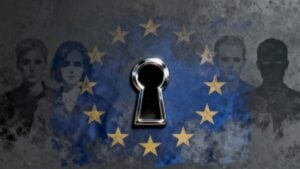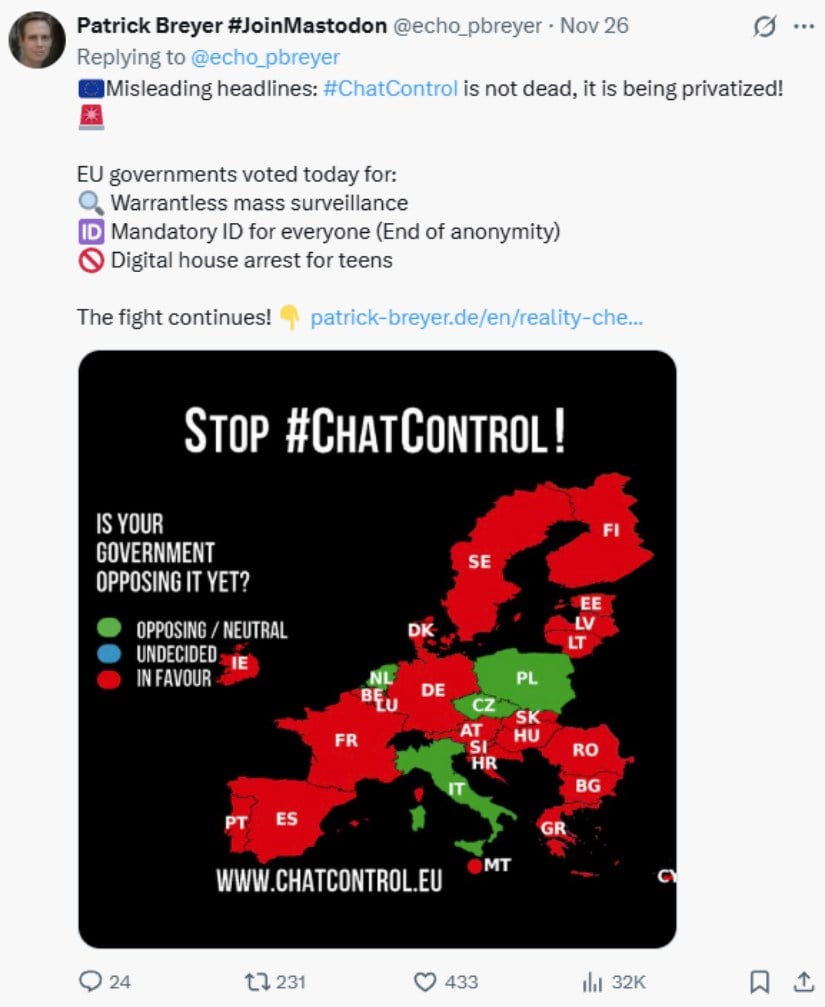
On November 26, 2025, EU member states agreed on a revised version of the Child Sexual Abuse Material (CSAM) regulation, commonly known as “Chat Control”. While the agreement removes mandatory message scanning, privacy experts warn the legislation still creates dangerous precedents for mass surveillance.
The legislation would affect all 450 million Europeans using digital communication services. Despite claims of protecting children, critics argue the proposal threatens fundamental privacy rights and could pave the way for broader government monitoring of private communications.
From Mandatory to “Voluntary” Surveillance
The current proposal represents a significant retreat from earlier versions that would have required all messaging platforms to scan private communications. The original plan faced fierce opposition from technology experts, privacy advocates, and several EU member states.
Germany played a crucial role in blocking the mandatory scanning requirements. The October vote scheduled for October 14, 2025 was cancelled after Germany joined a blocking minority representing more than 35% of the EU population.
The revised agreement makes voluntary scanning permanent under EU law. Currently, platforms can choose to scan for illegal content under temporary rules that expire in April 2026. The new legislation would make this voluntary framework permanent while introducing additional surveillance infrastructure.

Source: @echo_pbreyer
However, the “voluntary” nature may be misleading. The proposal includes vague language that could pressure platforms into implementing scanning systems. Companies deemed “high-risk” may be forced to develop technologies that monitor their users’ communications.
Technical Problems and False Alarms
One of the biggest concerns about Chat Control involves its technical reliability. Over 500 cryptographers and security researchers from 34 countries have called the proposal “technically infeasible” and a danger to democracy.
Real-world data shows why experts are worried. Swiss federal police report that 80% of machine-generated reports about suspicious content turn out to be false positives. German authorities received over 99,000 false reports about private chats and photos in 2024 alone.
These false alarms mean innocent people could face criminal investigations for sharing family photos, art, or other legal content. The AI systems designed to detect illegal material cannot reliably distinguish between harmful content and normal communications.
Encryption Under Threat
While the current proposal claims to protect encryption, privacy advocates argue it creates dangerous loopholes. The legislation includes review clauses that would reconsider mandatory scanning requirements every three years. This means future EU administrations could revive more invasive surveillance measures.
The proposal also introduces new types of scanning for “new material” and suspected grooming behavior. This would involve AI systems analyzing people’s conversations, photos, and videos without any prior suspicion of wrongdoing.
Patrick Breyer, a digital rights advocate and expert on the legislation, warns that the agreement represents “a green light for indiscriminate mass surveillance and the end of right to communicate anonymously.” (Source)
Impact on Digital Privacy Rights
The Chat Control proposal is part of a larger EU strategy called ProtectEU, which aims to give law enforcement agencies the ability to decrypt private data by 2030. This represents a major shift from the EU’s traditional role as a global privacy champion.
The legislation could require age verification for all digital services, potentially ending anonymous communication on the internet. Users might need to provide government identification to send messages, share photos, or access online platforms.
The proposal also introduces new infrastructure for blocking content, with each member state deciding what material to censor. This could lead to inconsistent enforcement across the EU and potential abuse by authoritarian-leaning governments.
Cryptocurrency and Privacy Tools Face Pressure
The surveillance debate extends beyond messaging apps to affect privacy-focused technologies. Major cryptocurrency exchanges have already responded to regulatory pressure by removing privacy coins from European markets. Kraken delisted Monero, while Binance removed privacy-focused tokens citing regulatory compliance.
This creates what privacy advocates call a “surveillance cycle” where increased government monitoring drives users toward decentralized alternatives, which then face new restrictions. Privacy-focused cryptocurrencies are already experiencing regulatory pressure across Europe.
Privacy experts predict that Chat Control could accelerate adoption of blockchain-based communication tools that operate outside government control. However, these alternatives remain technically challenging for average users.
The Road Ahead: Trilogue Negotiations
The Council agreement now moves to trilogue negotiations between EU member states, the European Parliament, and the European Commission. The Parliament previously voted to remove encryption scanning entirely in November 2023, setting up a potential conflict over the Council’s voluntary scanning framework.
Privacy advocates are urging Parliament negotiators to maintain their strong stance against surveillance measures. The final legislation must be agreed upon before April 2026, when current temporary scanning rules expire.
The negotiations will likely focus on several key issues: whether voluntary scanning creates unfair pressure on platforms, how to define “high-risk” services, and what safeguards exist to prevent future expansion of surveillance powers.
Digital rights organizations emphasize that the Council’s proposal still leaves multiple pathways open for future mass surveillance, including periodic attempts to reintroduce mandatory scanning through the review clauses.
Digital Crossroads: Privacy vs. Surveillance
The EU’s Chat Control legislation represents a critical moment for digital privacy rights in Europe. While the removal of mandatory scanning represents a victory for privacy advocates, the underlying surveillance infrastructure remains concerning.
The proposal’s vague language, review mechanisms, and voluntary framework could easily evolve into more invasive monitoring systems. For 450 million Europeans, the coming months of negotiations will determine whether the EU maintains its commitment to digital privacy or embraces a surveillance-based approach to online safety.
The debate extends far beyond Europe’s borders, as other governments watch how the world’s largest regulatory bloc balances security concerns with fundamental rights in the digital age.



























 24h Most Popular
24h Most Popular






 Utilities
Utilities